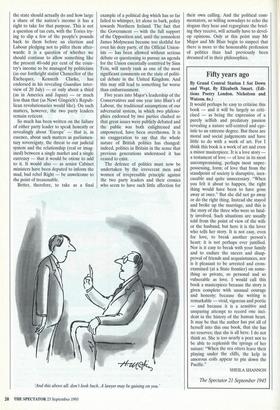Fifty years ago
By Grand Central Station I Sat Down and Wept. By Elizabeth Smart. (Edi- tions Poetry London. Nicholson and Watson. 6s.)
It would perhaps be easy to criticise this book — and it will be largely so criti- cised — as being the expression of a purely selfish and predatory passion revealing a nature self-centred and ego- istic to an extreme degree. But these are moral and social judgements and have little to do with a work of art. For I think this book is a work of art and even a minor masterpiece. It is a love story a testament of love — of love in its most uncompromising, perhaps most unpre- possessing, form; of love that from the standpoint of society is disruptive, inex- cusable and quite unnecessary. "When you felt it about to happen, the right thing would have been to have gone away at once." But she did not go away or do the right thing. Instead she stayed and broke up the marriage, and this is the story of the three who were so fatal- ly involved. Such situations are usually told from the point of view of the wife or the husband, but here it is the lover who tells her story. It is not easy, even for love, to break another person's heart: it is not perhaps ever justified. Nor is it easy to break with your family and to endure the sneers and disap- proval of friends and acquaintances, nor is it pleasant to be arrested and cross- examined (at a State frontier) on some- thing so private, so personal and so vulnerable as love. I would call this book a masterpiece because the story is given complete with unusual courage and honesty; because the writing is remarkable — vivid, vigorous and poetic — and because it is a sensitive and unsparing attempt to record one inci- dent in the history of the human heart. It may be that the author has put all of herself into this one book, that she has no reserves; that she is all here. I do not think so. She is too nearly a poet not to be able to replenish the springs of her nature: "When the sea otters leave their playing under the cliffs, the kelp in amorous coils appear to pin down the Pacific."
SHEILA SHANNON
The Spectator 21 September 1945


































































 Previous page
Previous page